Date: Sun, 10 Apr 2016 11:33:54 +0200
The conflict in South Sudan, where food insecurity will affect 7.5 million people this year, has left aid agencies struggling to bring vital supplies to remote areas. Kate Holt joined a rapid response mission to Thanyang, in Unity state, on behalf of Unicef and the World Food Programme. The mission brought food, medical supplies and vaccines to 15,000 people in an area where the only water comes from a nearby swamp and there are no health clinics, boreholes, schools or roads
All photographs: Kate Holt/Unicef
April 10, 2016
Comment: Due to greediness of Power/money, irresponsible negligence to the people’s security of Leaders of South Sudan and diverse foreign meddling in the internal affairs of South Sudan, the S. Sudanese People is suffering from this barbaric internecine war of destruction. This savage war leads the country and its people to enormous suffering, death, destruction of the country, lawlessness, banditry of warlords and massive outside exploitation of its natural wealth. The actors of the region and the powers of the world have the opportunity to manage, worsen the conflict and to use for their greedy interests. The leaders of the South Sudan in particular and the people in general must solve their problem primarily and learn how to build their nation and live together peacefully.
Berhane Habtemariam
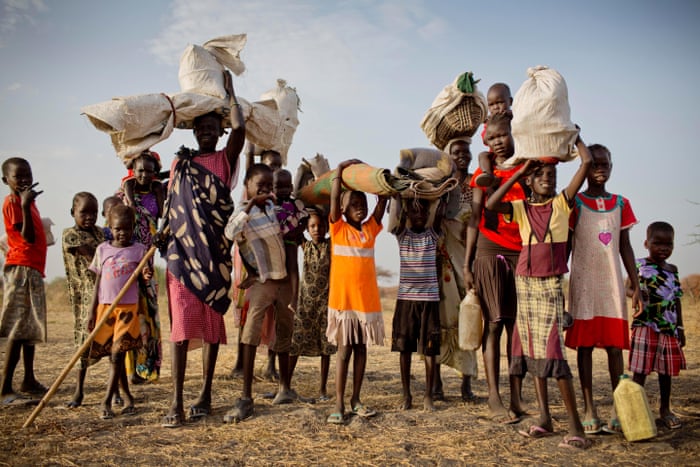 Families who have been displaced by ongoing fighting in South Sudan arrive with what few possessions they have at an emergency food distribution site in Thanyang, Unity state.
Families who have been displaced by ongoing fighting in South Sudan arrive with what few possessions they have at an emergency food distribution site in Thanyang, Unity state.They must register to receive a ration card that will allow them to get food aid at the site, set up as part of a rapid response mission run by Unicef and the World Food Programme (WFP) to support the most inaccessible regions affected by the civil war
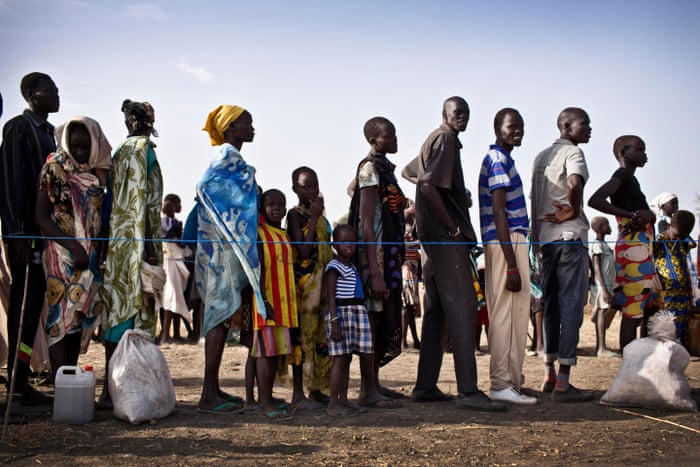 Nearly 15,000 people from surrounding areas have made their way to Thanyang to register for support, some walking for two days to get here. They live on an island surrounded by swamp in an opposition-controlled area. There are no health clinics, boreholes, schools or roads here
Nearly 15,000 people from surrounding areas have made their way to Thanyang to register for support, some walking for two days to get here. They live on an island surrounded by swamp in an opposition-controlled area. There are no health clinics, boreholes, schools or roads here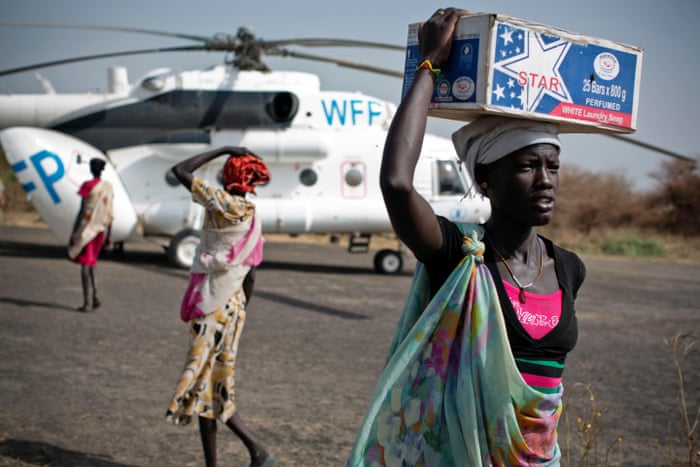 Women carry emergency supplies from a WFP helicopter.
Women carry emergency supplies from a WFP helicopter.South Sudan was plunged into civil war two years ago. Although a peace deal was signed in August 2015 between President Salva Kiir and his former vice-president Riek Machar, the increasingly fragmented nature of the conflict has meant that NGOs struggle to access remote communities
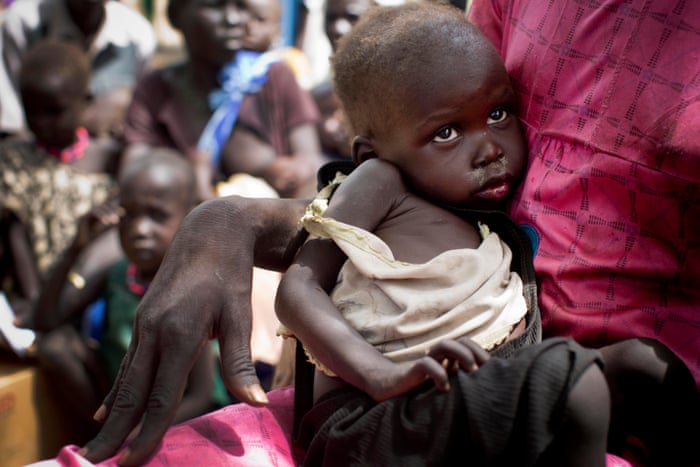 A woman holds her severely malnourished child as they wait to be registered to receive food aid. Food shortages have been particularly severe in Unity state. Unicef estimates that across South Sudan, 237,000 children will suffer from severe acute malnutrition in 2016, and food insecurity will affect 7.5 million people
A woman holds her severely malnourished child as they wait to be registered to receive food aid. Food shortages have been particularly severe in Unity state. Unicef estimates that across South Sudan, 237,000 children will suffer from severe acute malnutrition in 2016, and food insecurity will affect 7.5 million people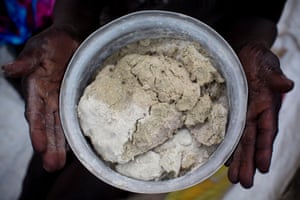
A pot with mashed water lily leaf – along with palm fruits, this forms the staple diet of families displaced by conflict and desperate for food.
The UN Office for the Coordination of Humanitarian Affairs (Ocha) estimates that 1.69 million people have been internally displaced
The UN Office for the Coordination of Humanitarian Affairs (Ocha) estimates that 1.69 million people have been internally displaced
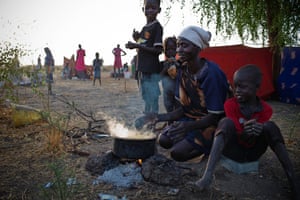
Nyaki Masha cooks an evening meal. ‘I come from Ngopson, which is about a 30-minute walk from here. I have six children with me. We were displaced by fighting last year and the house was burned down.
‘Now we are living under a tree with a piece of plastic sheeting to cover us. One of my children was shot last year by the soldiers when we fled. Two of my children died while we were living in the bush because we had no food. There are no schools for my children and when we are sick there is no clinic to go to’
‘Now we are living under a tree with a piece of plastic sheeting to cover us. One of my children was shot last year by the soldiers when we fled. Two of my children died while we were living in the bush because we had no food. There are no schools for my children and when we are sick there is no clinic to go to’
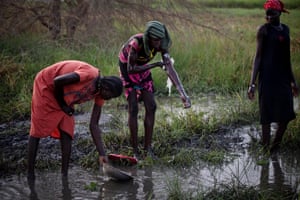
The only water to which people have access comes from the nearby swamp. Two women wash while a third collects water in a container
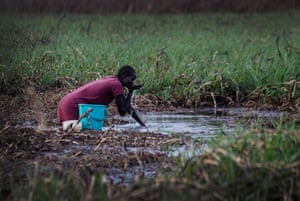
A woman drinks water from the swamp. Bany Makon, director of health for Unity state, says: ‘A big challenge is the lack of clean drinking water. There are many water-borne diseases like diarrhoea, cholera, typhoid. People are taking water straight from the river’
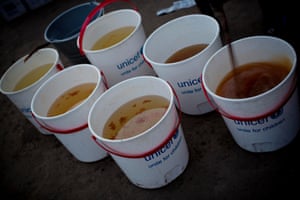
In Thanyang, a water and sanitation adviser from Unicef teaches people how to clean dirty water using chlorine sachets
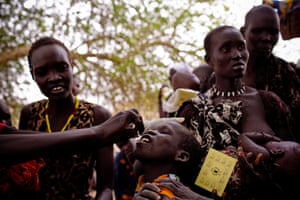
A child receives a polio vaccine from a Unicef volunteer. ‘We are seeing an increase in child and maternal mortality,’ says Makon. ‘There are no routine vaccination programmes … we have a lot of stillbirths and miscarriages because of the lack of maternal and child health services. The nearest referral hospital is in Bentiu, where there is a Médecins Sans Frontières hospital. This is a three-day walk’
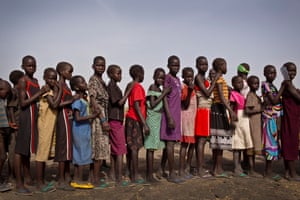
Young girls queue to register for school. Nyami says, ‘I think I am five years – that is what my mother told me. I have just registered for school. I haven’t been to school before. It is good to go to school. I came here with my mother. We walked for one day then slept outside and then walked another day to come.
‘We had no food so we came here to get food. I have two brothers and one sister. I want to go to school because my mother can’t read or write and I want to help her. I don’t know when I last ate – it wasn’t today. My favourite food is sorghum’
‘We had no food so we came here to get food. I have two brothers and one sister. I want to go to school because my mother can’t read or write and I want to help her. I don’t know when I last ate – it wasn’t today. My favourite food is sorghum’
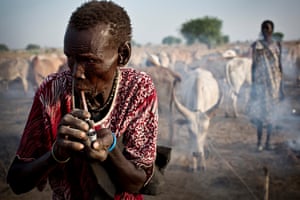
A female cattle keeper lights a pipe in front of her cows in Thanyang. Insecurity in the area is fuelled by conflicts over cattle and grazing
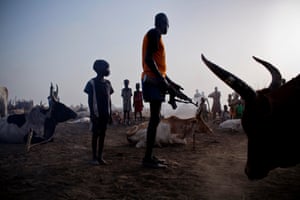
A cattle keeper guards his cows in a compound, watched by his young son. Thousands of people in Thanyang have received no support and food security is a big problem. Nobody has planted crops for the past two years
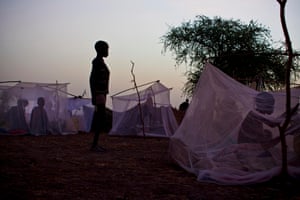
A young boy stands by the mosquito net that forms his family’s only shelter at night
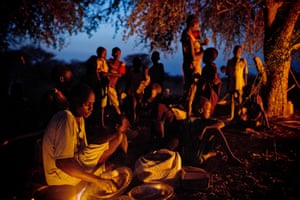
Women and their children, who have been displaced by ongoing fighting, camp out in the open while they wait to be registered to receive food aid
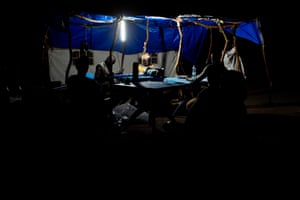
Staff members from Unicef and the WFP work late into the night, sorting registration tokens by the light of a solar-powered lamp
Kate Holt’s travel was funded by Unicef
Kate Holt’s travel was funded by Unicef